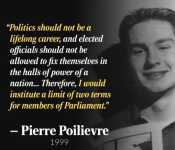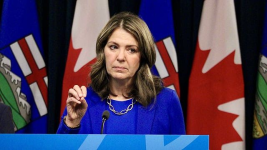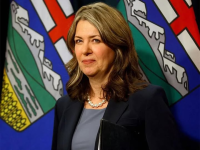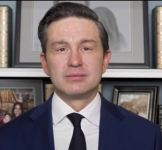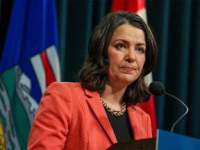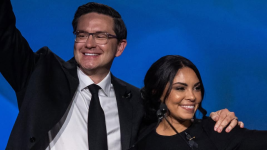They traded in their white sheets for black hats ….
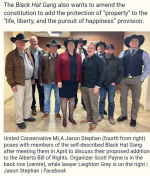 Angela Johnston Wilson
Angela Johnston Wilson ·
oStdpnoserM0214mMg08hP7ut:hgtgi5gayat5h ah1c5a8 895 80h8032 ·
The Black Hat Gang: Alberta’s Quiet Push for U.S.-Style Liberties
In the quiet prairie city of Medicine Hat, Alberta, a political movement has taken root under the name The Black Hat Gang. While the name may conjure images of outlaw biker crews or paramilitary factions, the reality is more subtle—but no less significant. The Black Hat Gang is composed primarily of local conservative activists, retired politicians, and United Conservative Party (UCP) insiders who share a deep dissatisfaction with federal oversight and a passionate drive to reshape Alberta's legal foundation in line with American constitutional ideals.
Wearing their trademark black cowboy hats, members of the group symbolize a return to what they view as fundamental freedoms: medical autonomy, gun rights, and aggressive property protections. Their push centers on a radical overhaul of the Alberta Bill of Rights, proposing a slate of 22 new "guarantees" that would codify a series of individual liberties rarely seen in Canadian provincial law.
Who Are the Black Hat Gang?
Estimates suggest the group includes about 20 to 30 active members, with a core leadership of roughly six to ten politically influential individuals. Among the most notable are:
LaVar Payne, former Member of Parliament for Medicine Hat from 2008 to 2015.
Scott Payne, LaVar’s son and a principal organizer of the movement.
Ian Parkinson, a longtime political figure and conservative activist in the region.
Mitch Sylvestre, president of the Bonnyville-Cold Lake UCP riding association and closely linked with the Take Back Alberta movement.
Leighton Grey, a lawyer known for representing clients who opposed COVID-19 public health measures and for promoting Alberta’s independence from federal governance.
The group operates through meetings, political lobbying, and media appearances. Rather than acting as a traditional political party, they function as a political pressure bloc, using their connections to influence legislative direction from within the UCP.
The Push to Rewrite the Alberta Bill of Rights
The group’s central demand is to enshrine 22 new rights into the Alberta Bill of Rights. Their proposals include:
《 The right to refuse medical treatment, including vaccinations, without penalty.
— Note: While Canadian law generally respects informed consent and bodily autonomy, public health mandates such as vaccination requirements have been upheld during health emergencies under provincial and federal authority.
《 The right to own and bear firearms, echoing the U.S. Second Amendment.
— Canada’s firearms laws are federally regulated under the Firearms Act and the Criminal Code; provincial laws cannot supersede federal firearms regulation. Alberta currently advocates for less restrictive gun laws but remains subject to federal regulation.
《 Expanded property rights, including the legal right to use “sufficient force” to defend one’s home and land.
— Canadian law allows reasonable self-defense, but the use of force is tightly controlled and subject to criminal law; "sufficient force" is legally interpreted case-by-case.
《 Protection from “excessive taxation” and unjust seizure of property.
— Taxation is constitutionally within federal and provincial jurisdiction; Alberta has among the lowest provincial tax rates in Canada.
《 The right of parents to make unimpeded decisions about their children's healthcare and education.
— Parental rights in Canada are balanced against child welfare laws and provincial education standards.
《 Guaranteed access to legal and medical services regardless of employment or union status.
— Canada’s universal healthcare system provides medical access regardless of employment; legal services are not guaranteed but are available via various public and private mechanisms.
《 Protections against “government interference” in religious expression and private enterprise.
— The Canadian Charter of Rights and Freedoms guarantees freedom of religion and reasonable limits on government interference, balanced with anti-discrimination laws.
These suggestions mirror the libertarian principles found in U.S. state constitutions, particularly in places like Texas, Idaho, and Florida. The underlying philosophy is one of maximum individual autonomy and minimal state intervention—principles that remain controversial in Canada’s parliamentary and communitarian legal culture.
Danielle Smith’s Role and Response
Premier Danielle Smith has met with the group and has expressed sympathy toward many of their ideas, particularly around bodily autonomy and parental rights. Her own political rhetoric often mirrors their language—she has previously advocated for medical choice during the pandemic and framed government mandates as violations of individual freedom.
While the group has not yet achieved a formal legislative victory, they are influencing UCP policy discussions. Red Deer-South MLA Jason Stephan has been a point of contact for them within government, helping to raise their proposals with caucus members. Other UCP legislators have acknowledged the group’s growing influence, especially in rural and southern Alberta constituencies.
Broader Implications for Alberta
The Black Hat Gang’s efforts signal a quiet but powerful ideological shift in Alberta’s conservative movement. Their proposed changes would move the province closer to an American-style legal framework, prioritizing individual rights over collective governance. Critics warn this could undermine federal norms, reduce protections for vulnerable groups, and lead to legal conflicts with the Canadian Charter of Rights and Freedoms.
This campaign also raises important questions about Alberta’s constitutional identity. While provinces can establish their own bills of rights, those laws cannot supersede federal law or the Charter. If the Black Hat Gang’s proposals were adopted in full, Alberta could face constitutional challenges and renewed tensions with Ottawa.
CONTINUED

